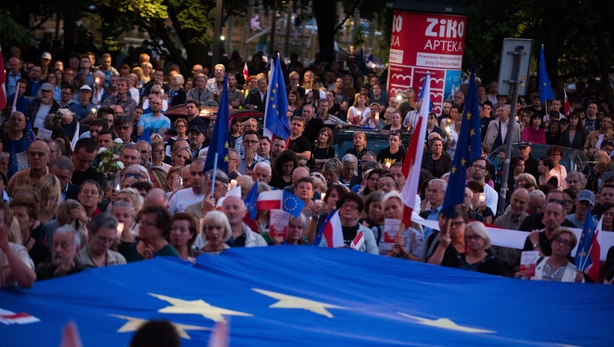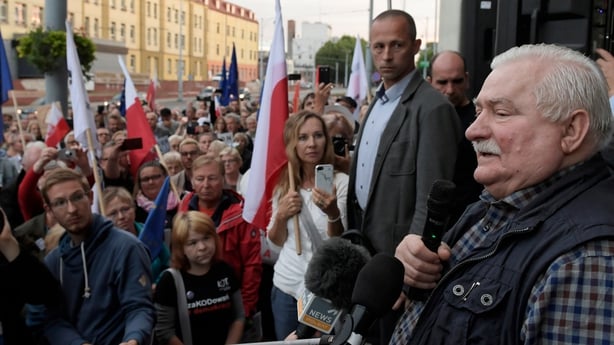Poland's Supreme Court chief justice showed up at work this morning in defiance of a retirement law pushed through by the right-wing government but criticised by the European Union as undermining judicial independence.
"I'm not engaging in politics; I'm doing this to defend the rule of law and to testify to the truth about the line between the constitution and the violation of the constitution," Malgorzata Gersdorf told reporters after emerging from the Supreme Court building in Warsaw.
"I hope that legal order will return to Poland."
Supporters chanting "constitution" and singing the Polish national anthem surrounded her at the entrance to the court.
We need your consent to load this rte-player contentWe use rte-player to manage extra content that can set cookies on your device and collect data about your activity. Please review their details and accept them to load the content.Manage Preferences
Poland's judiciary is at the centre of mounting conflict between the ruling Law and Justice party (PiS) and the European Union, which accuses Poland of trying to gain political control of the judiciary and of subverting basic democratic standards.
Under the new rules, which came into effect at midnight, up to a third of Supreme Court judges including 65-year-old Ms Gersdorf could be forced to retire unless they are granted an extension by President Andrzej Duda, a PiS ally.
Ms Gersdorf, who has been the president of the Supreme Court since 2014, believes the legislation is unconstitutional and cannot be implemented.
Polish Prime Minister Mateusz Morawiecki has defended the controversial judicial reforms at the European Parliament this morning, saying the overhaul was his government's right.
"Every EU country has the right to develop its judicial system according to its own traditions," Mr Morawiecki told MEPs in Strasbourg.
Opponents of the reforms planned further demonstrations in Warsaw today.
Among them is Lech Walesa, the Nobel Peace Prize laureate and former president, who is credited with bringing down communism when he was Solidarity trade union chief.


Through legislation and personnel changes, PiS has already taken de facto control of much of the judicial system since coming into power in 2015, including the constitutional tribunal and prosecutors, who now report directly to the justice minister.
The party argues this is needed to address ineffectiveness in a system steeped in communist-era mentality and power structures.
Critics at home and abroad accuse PiS of seeking control over courts for political gain, and say its policies, which also include tighter control of public media, amount to a shift towards authoritarian rule.
The conflict has isolated Poland within the EU, where most governments are critical, while also exposing the EU's inability to rein in governments it believes contradict core EU values.
The European Commission opened a fresh legal case against Poland over the Supreme Court changes on Monday, saying that they undermine judicial independence in the largest formerly communist member of the EU.
Poland faces the threat of losing its voting rights in the EU under a procedure launched late last year over judiciary reforms. Hungary, also facing criticism over democratic standards, has pledged to block such a move.
The eurosceptic PiS government rejects criticism, saying EU treaties do not give Brussels institutions the power to influence national matters such as the judiciary.
The party's standing in polls has held steady at around 40% throughout the dispute, well above any single rival party.

